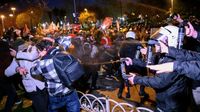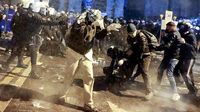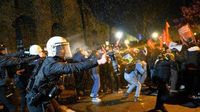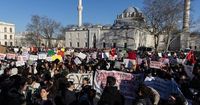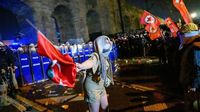In Turkey, a significant wave of protests erupted this week following the arrest of Istanbul's popular mayor, Ekrem Imamoglu. The demonstrations, which began on March 19, 2025, have attracted tens of thousands of participants despite the government's imposed ban on gatherings. On March 22, Interior Minister Ali Yerlikaya reported that at least 343 protesters had been arrested across more than ten cities, building tension and defiance as citizens rallied against what they perceive as politically motivated actions.
Demonstrators have taken to the streets under the slogan "Justice, Law, Fairness," denouncing the government's crackdown and expressing solidarity with Imamoglu. Eyewitness accounts suggest that nearly 300,000 protesters gathered in Istanbul alone, where confrontations with police escalated into violence. The police have responded with tear gas and rubber bullets, as protesters breached barricades and clashed with security forces, drawing parallels to earlier significant protests in Turkey's history.
Ekrem Imamoglu, who is also a leading figure of the Cumhuriyet Halk Partisi (CHP) party, has been accused of corruption and of supporting a terrorist organization. However, he has categorically denied these charges, calling them a political ploy aimed at undermining his potential candidacy for the upcoming presidential elections in 2028. His arrest came just as the CHP planned to nominate him as their candidate, further fueling suspicions regarding the motivations behind the government's actions.
According to the Turkish Ministry of Interior, the arrests have been described as necessary to prevent "disruption of public order." This statement was made in light of the growing unrest that followed Imamoglu's detainment. The ministry, along with President Recep Tayyip Erdogan, has reiterated that they will not tolerate any form of "chaos or provocation." The state of affairs has alarmed many, prompting concerns over the deterioration of democracy in Turkey.
As tensions rise, protesters have expressed their dire frustrations. CHP leader Özgür Özel, addressing the crowd in Istanbul, affirmed that the presence of protesters from various backgrounds indicates a united front against the current government. Despite the official prohibition against protests, demonstrators have claimed their right to gather, emphasizing that collective action is necessary for the preservation of democracy.
Adding to the divisive political atmosphere, reports have indicated that more than 90 arrest warrants have been issued against individuals supposedly spreading "provocative" messages on social media. Already, 56 arrests have been confirmed based on these warrants, illustrating the governmental crackdown on dissenting voices.
In a noteworthy development, the University of Istanbul recently invalidated Imamoglu's university degree, citing "irregularities." This move effectively bars him from competing in the upcoming elections, a strategy critics describe as an elaborate effort to remove a formidable challenger from the political landscape. The CHP has declared that it will continue to pursue gubernatorial proceedings for Imamoglu's nomination, pressing on despite the obstacles.
On March 22, the new wave of demonstrations showed no signs of abating. As police engaged with demonstrators in Istanbul, Ankara, and Izmir using water cannons and tear gas, calls for the resignation of President Erdogan echoed throughout major Turkish cities. Amid rumors of increasing authoritarian measures, the populace's outrage appears poised to escalate should Imamoglu face significant legal barriers or continue to be held in custody.
The political implications of these protests could shape Turkey's trajectory as it heads toward the next presidential election. Many view the current unrest as a significant challenge to Erdogan's government. The fact that this series of demonstrations has drawn unprecedented crowds mirrors the fervent protests against the regime following the 2016 attempted coup. Despite past government repression, citizens are now emboldened, with many feeling that the current political landscape could be a pivotal moment in Turkey's fight for democratic values.
The CHP remains firm in its support for Imamoglu, vowing to recognize his candidacy despite the surrounding controversies. As the situation unfolds, members of the CHP have rallied together, with Özel stating, “The individuals present here represent all parties and have come together to demonstrate solidarity in defense of Imamoglu and to protect democracy.” This declaration not only underscores the party's commitment to Imamoglu but also indicates a broader mobilization across a spectrum of Turkish society united against perceived government overreach.
As the night of March 22 approaches, Imamoglu is expected to appear before a judge, a moment that could mark a critical juncture in his legal battle and political future. Throughout the turmoil, the calls for justice continue to resonate, raising questions about the future of the opposition in Turkey and the fundamental integrity of its democratic processes.
What remains clear is the growing discontent among the populace. The encounters between demonstrators and law enforcement have escalated, and how the government responds in the coming days could significantly influence Turkey's political landscape. As protests unfold and solidarity builds, the future effectively hinges on the outcome of Imamoglu's case and the people's appetite for change in a country deeply divided along political lines.
Erdogan's presidency, which has faced increasing scrutiny, was reinforced by his own history of imprisonment during his time as the mayor of Istanbul in 1997. His subsequent rise to power reflects the complexities of Turkish politics, where the actions of today can echo through the corridors of power for generations to come. The resilience and resolve shown by demonstrators today could herald a significant shift, as they continue to demand accountability and reform.
